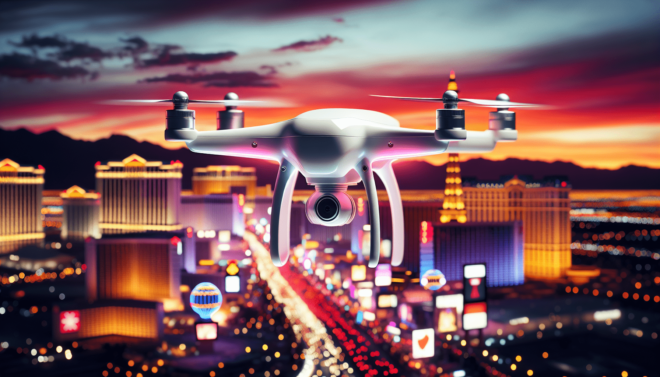Have you ever found yourself asking why drones aren’t allowed to fly over Las Vegas’ bustling theme parks? You’re not alone. With drones becoming increasingly popular for photography and recreation, many are curious about the restrictions that keep these flying marvels grounded. In this article, we’re going to explore the reasons behind these regulations, and you’ll gain a clearer understanding of why your drone needs to stay away from these exciting venues.
Understanding Drone Regulations
Before diving into specific restrictions in Las Vegas, it’s important to have a basic grasp of drone regulations. As an emerging piece of technology, drones have forced governments worldwide to establish new rules to ensure safety and privacy.
What Are Drone Regulations?
Drone regulations are guidelines set by authorities to govern the use of Unmanned Aerial Vehicles (UAVs), commonly known as drones. They are necessary because drones can pose risks to personal safety, aviation security, and personal privacy.
The Role of the Federal Aviation Administration (FAA)
In the United States, the Federal Aviation Administration (FAA) is the authority behind these regulations. You might think of the FAA as the drone police, making and enforcing rules to keep everything above ground safe and secure.
Key FAA Rules for Drone Operators:
| Rule | Description |
|---|---|
| Drone Registration | Drones weighing more than 0.55 lbs must be registered with the FAA. |
| Maximum Altitude | Drones can’t fly higher than 400 feet above ground level. |
| Line of Sight | Operators must keep drones within their visual line of sight. |
| Airspace Restrictions | Drones are prohibited from flying in restricted airspaces like airports. |
| Operational Restrictions | No flying over people, moving vehicles, or at night without special permits. |
The Appeal of Flying Drones in Las Vegas
Las Vegas, a vibrant city known for its entertainment and attractions, seems like a perfect backdrop for drone photography. From the glittering lights of the Strip to the bustling theme parks, capturing these visuals can help you share the city’s magic with the world.
Why Las Vegas?
Las Vegas is a city like no other. With iconic structures like the Bellagio Fountains and the Stratosphere, it offers a visual feast that seems perfect for drones. The city’s theme parks, with their thrilling rides and unique designs, only add to this allure.
The Thrill of Theme Parks
Theme parks are a world in themselves, with roller coasters whizzing by and crowds cheering with joy. Capturing these moments from the air with your drone might seem like an attractive proposition. However, there are reasons why Vegas’ theme parks are a no-drone zone.
Reasons Behind the Drone Ban Over Theme Parks
The ban on flying drones over theme parks in Las Vegas isn’t just a random rule. It’s grounded in real concerns about safety, privacy, and legal issues.
Ensuring Public Safety
Public safety is paramount, and drones, if not properly operated, can pose significant risks in crowded places like theme parks.
The Impact of Drone Accidents
Imagine the chaos if a drone were to malfunction and crash into a crowd. Injuries could range from minor cuts to serious wounds, and the potential for structural damage to rides or facilities makes the risks even greater.
Protecting Visitors’ Privacy
In theme parks, visitors expect a certain level of privacy while they relax and enjoy their time. Drones, equipped with high-resolution cameras, could potentially invade this privacy.
Privacy Concerns:
- Unwanted Surveillance: Visitors may be unknowingly filmed by a drone, raising concerns about their images being captured without consent.
- Data Security: Video and images captured by drones could be stored and misused by malicious operators.
Legal and Insurance Implications
It’s not just safety and privacy; there are legal and insurance concerns for both theme park operators and drone pilots.
Understanding Legal Liabilities:
- Responsibility for Accidents: If a drone causes damage, determining fault can lead to complex legal battles.
- Insurance Costs: The potential for accidents might increase insurance costs for theme parks, affecting their operational costs.
Airspace Regulations and Zoning Laws
Las Vegas theme parks often fall under restricted zones, governed by both federal laws and local regulations. This makes drone flying a no-go area over these locations.
Why Airspace Regulations Matter
Airspace regulations ensure that areas around sensitive sites like airports, military bases, and city centers are protected from unauthorized drone interference.
Types of Restricted Airspaces:
| Airspace Type | Description |
|---|---|
| Class B | Surrounds the nation’s busiest airports like McCarran International in Las Vegas. |
| Temporary Flight Restrictions (TFRs) | Imposed for specific events or security reasons, they can affect nearby theme parks. |
Local Zoning Ordinances
Beyond federal laws, local authorities also create zoning laws that restrict drone use in specific areas, including tourist spots and highly populated regions.
Zoning Ordinance Characteristics:
- Population Density: Areas with high foot traffic like theme parks are often restricted.
- Tourist Attractions: Protects areas popular with tourists to ensure safety and maintain the attraction’s appeal.
The Role of Theme Parks in Maintaining Safety
Theme parks themselves also have a hand in banning drones. They have their safety protocols and reasons for enforcing these restrictions on their premises.
Theme Park Policies and Security
Theme parks, like any business, prioritize the safety and experience of their visitors. By prohibiting drones, they are actively safeguarding their environment.
Security Measures Taken:
- Advanced Surveillance Systems: Parks already have robust surveillance in place to monitor activity.
- No-Drone Zones: Clear signage and policies are set to inform visitors of drone restrictions.
Consequences of Violating Drone Bans
Choosing to fly a drone over a restricted area isn’t without consequences, and understanding these can help you make informed decisions.
Legal Ramifications
Breaking the law by flying over prohibited areas can land you in hot water, with penalties ranging from fines to even jail time in severe cases.
Potential Legal Outcomes:
- Fines: These can be numerous and hefty, depending on the incident and location.
- Criminal Charges: In cases of significant damage or privacy breaches, criminal charges could be pursued.
Confiscation and Damage Liability
If you’re caught flying where you shouldn’t be, there’s also the risk of having your drone confiscated or being held liable for any damages or injuries caused.
Risks to Drone Operators:
- Drone Confiscation: Non-compliance can lead to losing your equipment.
- Financial Liability: Costs can escalate if damage or injury occurs due to a drone incident.
How to Safely and Legally Enjoy Drone Flying
While Las Vegas theme parks might be off-limits, there’s still a vast landscape of opportunities for drone enthusiasts that are both safe and legal.
Check Regulations and Flight Restrictions
Before setting out with your drone, always ensure that you comprehend the rules and restrictions applicable to the area.
Resources for Drone Operators:
- FAA B4UFLY App: A smartphone app offering real-time data on airspace restrictions.
- Local Drone Clubs: Community clubs that provide updates and guidance on flying safely.
Explore Alternative Locations
Las Vegas and Nevada offer numerous locations where drone flying is permitted, allowing you to capture breathtaking visuals without the worry of violations.
Noteworthy Drone-Friendly Spots:
- Red Rock Canyon: Stunning natural scenery that’s perfect for capturing with a drone.
- Lake Mead National Recreation Area: Offers a beautiful expanse and is popular with drone operators.
Staying Updated on Regulations
Drone regulations can change, so staying informed is crucial to ensure compliance and avoid penalties.
Where to Find Reliable Information
As a drone operator, you should regularly check updates from trusted sources to ensure you’re flying within the law.
Key Information Sources:
| Resource | Purpose |
|---|---|
| FAA Website | Official announcements and updates on regulations. |
| Local Government Websites | Provides area-specific rules and restrictions. |
| Drone Enthusiast Forums and Communities | Share experiences and advice with other operators. |
The Future of Drone Regulations
With technology continuously advancing, anticipate changes in drone regulations as authorities strive to balance innovation with safety.
Future Trends to Watch:
- Autonomous Drones: As tech develops, rules for autonomous drones could evolve significantly.
- Urban Air Mobility (UAM): The integration of drones into urban environments might bring about new regulations.
Conclusion
While it might be disappointing that you can’t fly your drone over Las Vegas’ theme parks, understanding the reasons behind this ban empowers you to act responsibly. By following established guidelines and exploring other scenic locales, you can enjoy the thrill of drone flying without compromising safety or legality. Embrace the opportunity to explore other breathtaking areas where your drone can soar freely.

